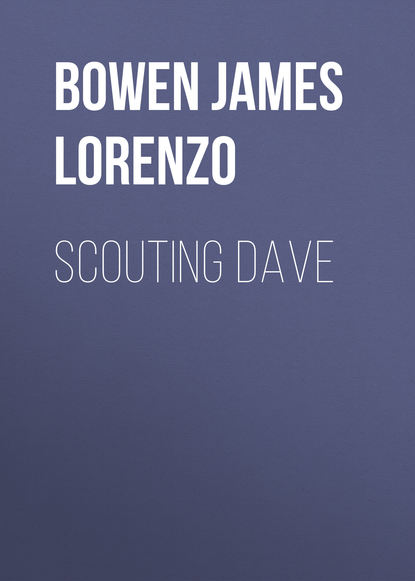По всем вопросам обращайтесь на: info@litportal.ru
(©) 2003-2025.
✖
Scouting Dave
Настройки чтения
Размер шрифта
Высота строк
Поля
David Barring had laid his plans with much deliberation. He had carefully noted the position of the canoes; and the disposition of the party left to guard them.
The rapid steps of the scout soon brought him to the vicinity of his swarthy foes. Now it became necessary for him to pursue his way with the utmost caution. For this purpose he crawled cautiously up until he reached a small eminence, which gave a distinct view of the scene below. A single large fire had been built, and around this at least half the savages were lazily reclining, smoking or eating. The remainder were scattered carelessly about, while the light of the fire revealed many a dusky form crouching in the boats.
The canoes had been drawn high up on the bank, while the larger boats had been left floating, being merely secured to the shore. There were many of the lighter craft floating also, and, so far as the keen eye of David could determine, the latter were unoccupied.
Even while the scout gazed he noticed that many of the savages were seeking their blankets for sleep, and he waited for a time in the hope that a general retiring might take place. In this he was not gratified; and, as delay might be dangerous, he carefully retreated, and moved away to the accomplishment of his design. Yet the cautiousness he was forced to observe required time, and it was a long while before he reached the margin of the stream.
At length he reached the uppermost of the flotilla, and beneath the deep shadow of a canoe he raised himself partially from the water, and drew a long breath of relief and pleasure. His heart gave a happy throb at his success.
The next task would be to select the proper boat. The one he grasped was too large for his purpose, the second too small. He dropped down till his hand rested upon the one he desired. He ran his hand and eye over it, felt the depth and capacity, assured himself no one was within, and at once pronounced it his own. Yet David was doomed to disappointment.
Cautiously moving near the middle of the boat, his foot struck something which a gentle pressure assured him was firm. Thinking it might be the ground, he rested upon it, and continued his onward movement. As ill-luck would have it, instead of stepping upon the river-bottom, the scout had planted his feet upon a large log, which had become partially imbedded there. He was not aware of the mistake until his foot slipped from the slimy wood, and, with a “plash,” he fell into the disturbed flood.
Quickly recovering his equilibrium, the swimmer glided from the spot, and reached the shadow of one of the large boats. Scarcely had he disappeared when a dusky visage might have been seen peering over the edge of a canoe near by. A single guttural exclamation soon brought half a dozen companions, who proceeded to a careful survey of the craft and water about.
Luckily the Indians were not deeply interested, merely supposing the disturbance caused by some aquatic animal, of which they sought traces only from idle curiosity. Finding nothing to reward their search, the savages seated themselves in the neighbouring boat, to await the reappearance of the nocturnal disturbant. A stealthy glance revealed to David the new position of his foes, and assured him that all further operations in that quarter were utterly impracticable.
It was a hundred yards or more to the further end of the flotilla, and, as attraction now tended this way, it was but reasonable to suppose he might succeed there. Sinking beneath the waters David swam a long distance, till compelled to come to the surface for air. He was gratified to find that he had passed more than half the distance, and was beyond the line of vision of the savages.
Striking out in an oblique direction he approached the boats. This time he moved with redoubled caution, and, as the deep shadow was in his favour, he soon selected a promising craft. In a few minutes he had cut the rope, towed it into the current, and was floating it gently downward.
No sooner was the scout satisfied of his security, than he threw himself into the boat, and groped about for the paddles. His heart gave a great leap – then stood still. He had no means of propelling or guiding his boat!
For a moment David was confounded; then his natural daring came to his aid. Leaping at once into the water, he gave the boat a vigorous push down the stream. Then he turned and paddled hastily toward the flotilla. Again he reached it unobserved, and selected a second boat, very similar to the other in size and construction.
Assuring himself that this contained the requisite number of paddles, he cut it loose and was soon drifting down the current as before.
It was not a pleasant thought to the brothers, that of their isolated condition and their peril, which would force itself upon them, after the departure of the scout. As time passed, and the possibility that he might have failed, even in his moment of confidence, would force itself upon them, they realized how much their fate was bound up in his – how very essential his welfare and success were to their own.
At length Alfred, who stood upon the brink of the river, earnestly listening for the approach of the scout, saw something which bore a resemblance to the expected boat. It was gliding gently along, and was quite near before he had discerned it. Satisfying himself as to its character, he addressed his brother. In a moment Charles was beside him.
“Look there?” whispered Alfred, pointing in the direction of the boat; “Davy is coming, at length.”
To their surprise, the object continued upon its course, and passed the point upon which they were standing. The young men looked at each other in mute surprise. Alfred was the first to speak.
“Can it be that he has mistaken the place where he left us?” he whispered.
Charles shook his head perplexedly.
In a moment more the strange object had passed from view.
“What does it mean?” asked the younger.
“It is all a mystery to me,” replied the other. “I am almost sure it can not be Davy. He would hardly have mistaken the rendezvous.”
“Indians?” suggested Alfred, in a tone which spoke more than the word itself implied.
“Hardly; though if it be so we shall soon hear from them. I could see no person in the craft, nor did its motions seem to indicate that it was loaded.”
“It can not be that the scout has been – ”
“Hist! Do not even mention that – it is too horrible for thought! Heaven only knows what our position would be, should harm come to him.”
Charles moved back to his former position, a few yards in the rear of his brother, to keep watch that no foe should steal upon them from that direction. The mind of each was filled with the most stirring apprehensions, and every moment they really expected to see their murderous foes stealing upon them, or hear their horrid yells.
Some minutes passed, when Alfred fancied he saw something move above them. His heart gave a great bound of joy, as he thought that the scout might be coming, and then a thrill of excitement passed over his frame, as he reflected that it might be their savage foes. He listened intently. This time the regular “dip” of paddles gave assurance that something of life was within the canoe. Signaling his brother, they silently awaited the approach of the floating object. They were not long in suspense.
The boat was quite near the shore, and heading directly toward the point upon which they stood. As it came nearer they could discern an upright figure, guiding it toward the land. In another moment it grated upon the sand, and David sprung out.
“Give me my tools,” he hastily exclaimed. “There’s not a minnit tew lose. I sarcumvented the devils, but they’re arter me; so be lively.”
He grasped his weapons as he spoke, and in another moment the three were seated in the boat. One vigorous push and it was afloat upon the dark waters.
“Lay her straight acrost the river,” exclaimed David, the Markleys having taken the oars to allow the taxed muscles of the scout to relax.
“Seems I didn’t git much start on ’em,” he added, “for they set up a yellin’ an’ started arter me with another boat. They gi’n me a race down the river, but that don’t matter – they can’t overhaul us!”
Bending his head over the side of the canoe, he listened intently. Suddenly he started up with energy.
“We don’t gain any,” he said, “but are holdin’ our own, good. Ladle the water with a will, boys, and we’ll weather ’em, for every stroke now counts one!”
The brothers realized the importance of their exertions, and, with ceaseless sweeps, sent the boat skimming forward. The scout was still leaning over the side, listening, when suddenly he started, as though struck by a rifle-shot.
“Hold up a moment; let me listen!” he remarked, in a tone of mingled impatience and alarm.
They obeyed. What sound was that which sent the blood back in cold streams to the hearts of the brothers? At no great distance in advance of them, could be heard the confused murmur of voices, and splashing of paddles? No wonder the scout’s cheek momentarily blanched, and his eyes seemed starting from the sockets, in the vain effort to penetrate the gloom. Much as the darkness obscured the vision, it was all that saved David Barring now.
Bending close to the brothers, and speaking in that calm tone which marked the man during seasons of greatest danger, he said:
“Turn her down-stream, boys, and row fer yer lives. We’re runnin’ square into a nest of the human hornets. Paddle lively; fer, if the moon rises, we’re goners – that’s all!”
The brothers comprehended only too well their peril to hesitate for a moment. The canoe was turned in the required direction; but, ere this was accomplished, they could distinctly hear the rapid approach of the Indian flotilla. So soon as the new direction was taken, they laboured with a determination which almost threw the craft from the water at each successive stroke; but a cruel fate was against them.
“It’s no use,” the scout at length whispered; “we can’t pass ’em in that way! All we kin dew, is to turn back, and run the resk of these red fiends behind us!”
It was a hazardous course, but the only one left open to the fugitives.
The result was highly fortunate for the adventurers. The pursuers had been guided only by the sound of oars, and, when these ceased to be heard distinctly, they paused, assured that the flotilla could not miss the refugees. Of course, the pursuers soon met the others, and instituted inquiries for the run-away boat. As no such object had been seen, the pursuers were placed in a suspicious light, and gladly turned to accompany their friends to the Illinois shore.
Meanwhile, Davy and his companions were making the most of every moment. Finding they were not likely to encounter the boat which had kept so closely in their wake, they bent every effort toward making good their escape. Almost before the party were aware of it, they shot in near the eastern shore of the river. Already the full light of the moon fell in gentle floods upon the water. The flotilla was thus fully revealed – every boat being brought out in dark outline upon the smooth surface of the river.
Considerable of the eastern side was shadow, rendered even darker by the gentle light falling around. In this broad belt of blackness our friends now lay, concealed from the sharp eyes of the approaching savages.
“I tell you, boys,” the scout observed, “if we’d run intew that neest, we’d stood a smart chance of havin’ our ha’r lifted afore this. It’s a lucky move we’ve made, this time, and now we’ll keep down in this ’ere shadder, till we git well out o’ their way.”
The party again bent themselves to their tasks, though panting and wearied, keeping the boat well within the deep shadow cast by the forest. They pulled silently down, until the scout, who had taken to the paddle, bent low, and peered across the river.
“Near’s I kin make out,” he remarked, “we’re about opposite one o’ the purtiest little hidin’-places that the good Lord ever made. Thar’s a little ’dentation, in the shore, what’s been washed out till it makes the neatest kind of a place. I kin hide a boat thare, so an Injin would step right over it forty times, an’ never think any thing was under him. If we kin git thare, ’twill be jist the place we want!”








